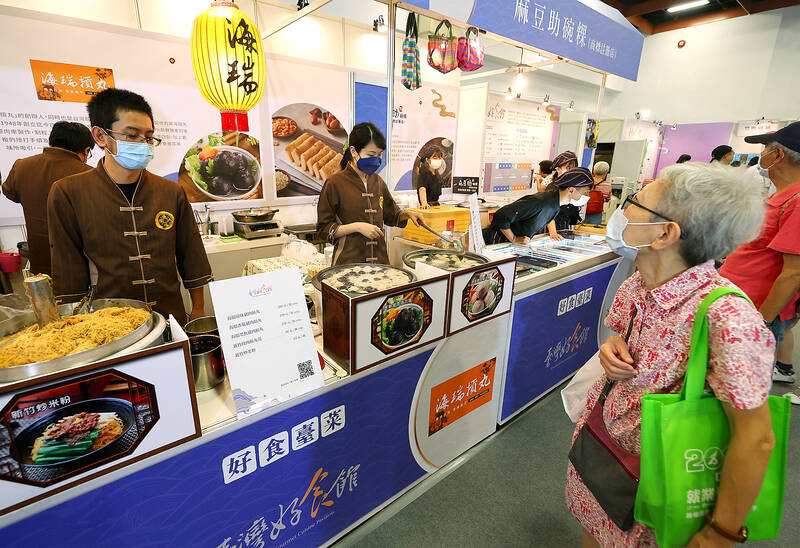Taiwanese are more financially resilient today than they were two years ago, but the gap between those who can easily withstand unexpected events influencing their finances and those who cannot is growing, a survey commissioned by the Taiwan Academy of Banking and Finance found.
With economic effects of the COVID-19 pandemic easing, Taiwanese are about as financially resilient as Britons, Americans and people in other major economies in terms of keeping savings, meeting living expenses and having access to financial services, academy president Hank Huang (黃崇哲) said.
People’s ability to withstand unexpected financial risks was also slightly higher than in 2020, with 7 percent more people having at least six months of income in savings, he said.

Photo: CNA
However, the gap between high and low-income earners increased, Huang added.
The aggregate ratio between those with six months of income in savings and those with less was about 60 percent, with the resilience of middle-income earners especially hit by the pandemic, he said.
Overall, the number of people who reported being easily able to meet living expenses had more than doubled, from 12.2 percent to 27.3 percent, he said.
However, there were still almost 20 percent who said they would be unable to deal with a financial emergency, with only a small drop in this category from 19.5 percent in 2020 to 18.8 percent this year, Huang said.
Digital banking platforms have allowed uninterrupted access to financial services throughout the pandemic, with more people investing money, especially through fractional share trading, than two years ago, Huang said.
Overall borrowing capacity has improved, with 5 percent fewer people fearing they might be unable to borrow money in case of an emergency, and 40 percent of respondents saying they could obtain a mortgage or a loan from a financial institution, he said.
Low-income families were most severely affected by the pandemic, accounting for the majority of those reporting that they have trouble saving money or staying within their budget, Huang said, adding that this group was also the most vulnerable to financial fraud and exploitation due to weak financial literacy and insufficient financial confidence.
In terms of age, those aged 20 to 29 were the only group reporting a decline in financial resilience, he said.
“The decline in financial literacy, and poor savings and fundraising ability, in this age category demonstrates an urgent need for financial education for young people,” Huang said.

The Grand Hotel Taipei on Saturday confirmed that its information system had been illegally accessed and expressed its deepest apologies for the concern it has caused its customers, adding that the issue is being investigated by the Ministry of Justice Investigation Bureau. The hotel said that on Tuesday last week, it had discovered an external illegal intrusion into its information system. An initial digital forensic investigation confirmed that parts of the system had been accessed, it said, adding that the possibility that some customer data were stolen and leaked could not be ruled out. The actual scope and content of the affected data

‘LIKE-MINDED PARTNER’: Tako van Popta said it would be inappropriate to delay signing the deal with Taiwan because of China, adding he would promote the issue Canadian senators have stressed Taiwan’s importance for international trade and expressed enthusiasm for ensuring the Taiwan-Canada trade cooperation framework agreement is implemented this year. Representative to Canada Harry Tseng (曾厚仁) in an interview with the Central News Agency (CNA) said he was increasingly uneasy about Ottawa’s delays in signing the agreement, especially as Ottawa has warmed toward Beijing. There are “no negotiations left. Not only [is it] initialed, we have three versions of the text ready: English, French and Mandarin,” Tseng said. “That tells you how close we are to the final signature.” Tseng said that he hoped Canadian Prime Minister Mark Carney

POSITIVE DEVELOPMENT: Japan and the US are expected to hold in-depth discussions on Taiwan-related issues during the meeting next month, Japanese sources said The holding of a Japan-US leaders’ meeting ahead of US President Donald Trump’s visit to China is positive news for Taiwan, former Japan-Taiwan Exchange Association representative Hiroyasu Izumi said yesterday. After the Liberal Democratic Party’s landslide victory in Japan’s House of Representatives election, Japanese Prime Minister Sanae Takaichi is scheduled to visit the US next month, where she is to meet with Trump ahead of the US president’s planned visit to China from March 31 to April 2 for a meeting with Chinese President Xi Jinping (習近平). Japan and the US are expected to hold in-depth discussions on Taiwan-related issues during the

President William Lai (賴清德) yesterday bestowed one of Taiwan’s highest honors on Saint Vincent and the Grenadines (SVG) Ambassador Andrea Clare Bowman in recognition of her contributions to bilateral ties. “By conferring the Order of Brilliant Star with Grand Cordon on Ambassador Bowman today, I want to sincerely thank her, on behalf of the Taiwanese people, for her outstanding contribution to deepening diplomatic ties between Taiwan and SVG,” Lai said at a ceremony held at the Presidential Office in Taipei. He noted that Bowman became SVG’s first ambassador to Taiwan in 2019 and